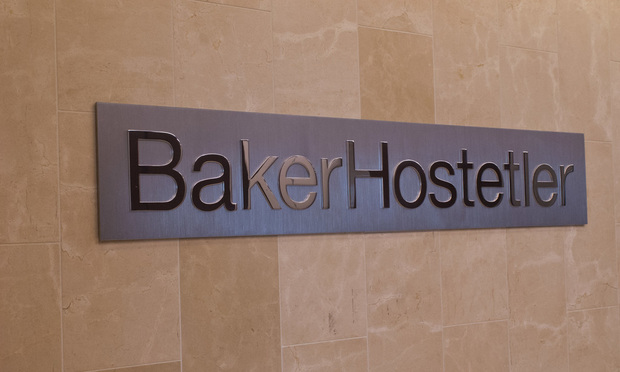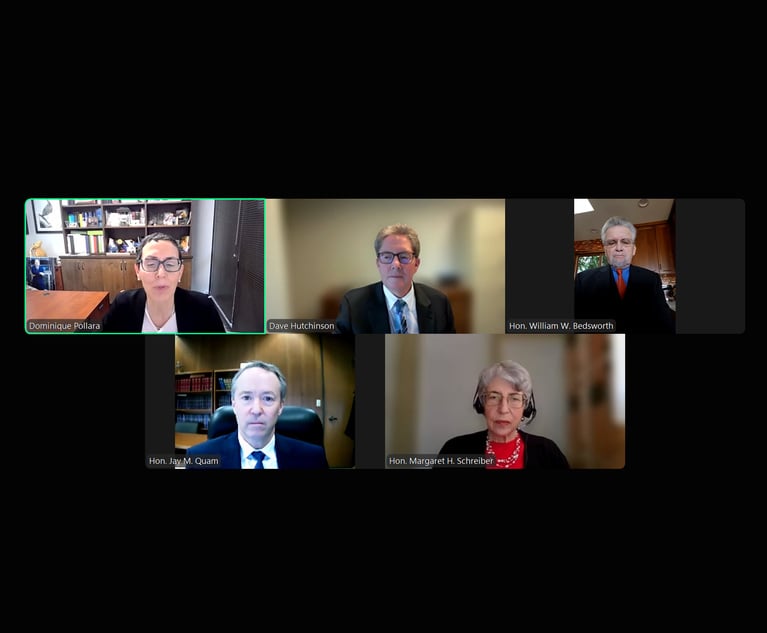Opioid Judge Weighs Disqualifying Baker Hostetler as Defense Counsel
U.S. District Judge Dan Polster heard testimony Wednesday from Baker Hostetler partner Carole Rendon about her former job as U.S. Attorney for the Northern District of Ohio, during which she headed an opioid task force.
February 06, 2019 at 07:31 PM
5 minute read
The original version of this story was published on Law.com
 Baker & Hostetler office sign/photo by John Disney/ALM
Baker & Hostetler office sign/photo by John Disney/ALM
A federal judge overseeing the first federal trial against opioid defendants said he would reach out to the U.S. Department of Justice to determine whether to disqualify defense attorney Carole Rendon and her firm, Baker & Hostetler, from the case.
U.S. District Judge Dan Polster, who is overseeing more than 1,500 lawsuits by cities and counties across the country, heard testimony in court Wednesday from Rendon and three public officials about her former job as U.S. Attorney for the Northern District of Northern District of Ohio, during which she headed an opioid task force. Rendon, who is a partner in Cleveland, represents Endo Pharmaceuticals Inc., one of the opioid manufacturers in the case.
“These cases don't fit well in a courtroom and, candidly, this issue doesn't fit very well in the cases that either side cited or the model rules,” Polster said Wednesday after three hours of testimony and arguments. “The DOJ had offered sometime in 2018 to participate as a friend of the court. The court needs a friend.”
The DOJ, he said, would know whether Rendon had obtained confidential information while on the task force, and “I'll use that as a basis to make my decision. I think that's the best way to do it.”
He ordered that Rendon and Baker Hostetler refrain from participating in any more depositions in the case but emphasized that his ruling, whatever it turned out to be, would be limited to the bellwether case going to trial Oct. 21. The cities of Cleveland and Akron, Ohio, and two Ohio counties, are the plaintiffs in that case.
Polster also said he would not allow plaintiffs' attorneys to depose Rendon as an alternative to disqualification.
On the stand, Rendon was emphatic she had no confidential information that would justify her disqualification.
“I have worked with and worked side by side who are rule followers, who are rule benders, people who are rule breakers, and I am to a fault a rule follower,” Rendon said.
The hearing comes in response to a motion lead plaintiffs' attorneys filed last month seeking to disqualify Rendon and Baker Hostetler from the bellwether case. In the motion, they insisted both had violated the Ohio Rules of Professional Conduct, specifically Rule 1.11, which bars former government attorneys from representing a client “in connection with a matter” in which they participated or when possessing confidential government information.
They argued that Rendon, who also is co-liaison counsel for all the manufacturing defendants in the bellwether case, could have knowledge of law enforcement actions and resources involving the opioid crisis, some of which she could have used in depositions. Rendon was U.S. Attorney for the Northern District of Ohio in 2016 and 2017 and a federal prosecutor in that office beginning in 2009. She also spearheaded the U.S. attorney's heroin and opioid task force, which included officials from Cleveland and Cuyahoga County.
The motion said her actions, as Endo's counsel, “will severely undermine the public confidence in the legal system.”
In court documents opposing the motion, Parker wrote that Rendon had broken no rules and that the task force information was never confidential. Further, he added, the appearance of impropriety was not the standard under the Ohio Rules of Professional Conduct. Other defendants filed documents joining in Endo's opposition to the disqualification motion, and 20 former U.S. attorneys, from states including Florida, Texas, New Jersey, Pennsylvania, Georgia and California, filed an amicus brief supporting Endo on Wednesday.
“There's a bunch of hurdles the plaintiffs have to get over, none of which they have presented evidence of today,” Parker said in court Wednesday. “You heard a lot of testimony today about how public all of this was. In fact, there were members of the media attending the opioid task force.”
At Wednesday's hearing, Rendon and three public officials took the stand, questioned by plaintiffs' attorney Peter Weinberger, of Cleveland's Spangenberg Shibley & Liber, and two defense lawyers: John Parker, who is another Baker Hostetler partner in Cleveland, and Jonathan Stern, a Washington, D.C., partner at Arnold & Porter Kaye Scholer, which also represents Endo. Two of the witnesses, Gary Gingell, commander of the Cleveland Division of Police, and Dr. Thomas Gilson, who is Cuyahoga County's Medical Examiner, were on the task force with Rendon. When probed by Endo's lawyers, they acknowledged that other individuals, such as doctors and members of the media, were on the task force.
But when asked how he felt with Rendon at his deposition, one witness, Gingell said, “Personally, I was very uncomfortable, extremely uncomfortable.”
In court, Polster asked Rendon how she felt when two task force members testified about feeling betrayed when they discovered she was representing an opioid defendant in the case.
“I don't agree with their perceptions,” she added. “They have a job to do. I have a job to do, and I'm doing it within the best of my ability.”
This content has been archived. It is available through our partners, LexisNexis® and Bloomberg Law.
To view this content, please continue to their sites.
Not a Lexis Subscriber?
Subscribe Now
Not a Bloomberg Law Subscriber?
Subscribe Now
NOT FOR REPRINT
© 2025 ALM Global, LLC, All Rights Reserved. Request academic re-use from www.copyright.com. All other uses, submit a request to [email protected]. For more information visit Asset & Logo Licensing.
You Might Like
View All
Litigators of the Week: After a 74-Day Trial, Shook Fends Off Claims From Artist’s Heirs Against UMB Bank

‘It's Your Funeral’: Avoiding Doing Damage to Your Client’s Case With Uncivil Behavior
Trending Stories
- 16-48. It’s Comp Time Again: How To Crush Your Comp Memo
- 2'Religious Discrimination'?: 4th Circuit Revives Challenge to Employer Vaccine Mandate
- 3Fight Over Amicus-Funding Disclosure Surfaces in Google Play Appeal
- 4The Power of Student Prior Knowledge in Legal Education
- 5Chicago Cubs' IP Claim to Continue Against Wrigley View Rooftop, Judge Rules
Who Got The Work
Michael G. Bongiorno, Andrew Scott Dulberg and Elizabeth E. Driscoll from Wilmer Cutler Pickering Hale and Dorr have stepped in to represent Symbotic Inc., an A.I.-enabled technology platform that focuses on increasing supply chain efficiency, and other defendants in a pending shareholder derivative lawsuit. The case, filed Oct. 2 in Massachusetts District Court by the Brown Law Firm on behalf of Stephen Austen, accuses certain officers and directors of misleading investors in regard to Symbotic's potential for margin growth by failing to disclose that the company was not equipped to timely deploy its systems or manage expenses through project delays. The case, assigned to U.S. District Judge Nathaniel M. Gorton, is 1:24-cv-12522, Austen v. Cohen et al.
Who Got The Work
Edmund Polubinski and Marie Killmond of Davis Polk & Wardwell have entered appearances for data platform software development company MongoDB and other defendants in a pending shareholder derivative lawsuit. The action, filed Oct. 7 in New York Southern District Court by the Brown Law Firm, accuses the company's directors and/or officers of falsely expressing confidence in the company’s restructuring of its sales incentive plan and downplaying the severity of decreases in its upfront commitments. The case is 1:24-cv-07594, Roy v. Ittycheria et al.
Who Got The Work
Amy O. Bruchs and Kurt F. Ellison of Michael Best & Friedrich have entered appearances for Epic Systems Corp. in a pending employment discrimination lawsuit. The suit was filed Sept. 7 in Wisconsin Western District Court by Levine Eisberner LLC and Siri & Glimstad on behalf of a project manager who claims that he was wrongfully terminated after applying for a religious exemption to the defendant's COVID-19 vaccine mandate. The case, assigned to U.S. Magistrate Judge Anita Marie Boor, is 3:24-cv-00630, Secker, Nathan v. Epic Systems Corporation.
Who Got The Work
David X. Sullivan, Thomas J. Finn and Gregory A. Hall from McCarter & English have entered appearances for Sunrun Installation Services in a pending civil rights lawsuit. The complaint was filed Sept. 4 in Connecticut District Court by attorney Robert M. Berke on behalf of former employee George Edward Steins, who was arrested and charged with employing an unregistered home improvement salesperson. The complaint alleges that had Sunrun informed the Connecticut Department of Consumer Protection that the plaintiff's employment had ended in 2017 and that he no longer held Sunrun's home improvement contractor license, he would not have been hit with charges, which were dismissed in May 2024. The case, assigned to U.S. District Judge Jeffrey A. Meyer, is 3:24-cv-01423, Steins v. Sunrun, Inc. et al.
Who Got The Work
Greenberg Traurig shareholder Joshua L. Raskin has entered an appearance for boohoo.com UK Ltd. in a pending patent infringement lawsuit. The suit, filed Sept. 3 in Texas Eastern District Court by Rozier Hardt McDonough on behalf of Alto Dynamics, asserts five patents related to an online shopping platform. The case, assigned to U.S. District Judge Rodney Gilstrap, is 2:24-cv-00719, Alto Dynamics, LLC v. boohoo.com UK Limited.
Featured Firms
Law Offices of Gary Martin Hays & Associates, P.C.
(470) 294-1674
Law Offices of Mark E. Salomone
(857) 444-6468
Smith & Hassler
(713) 739-1250








